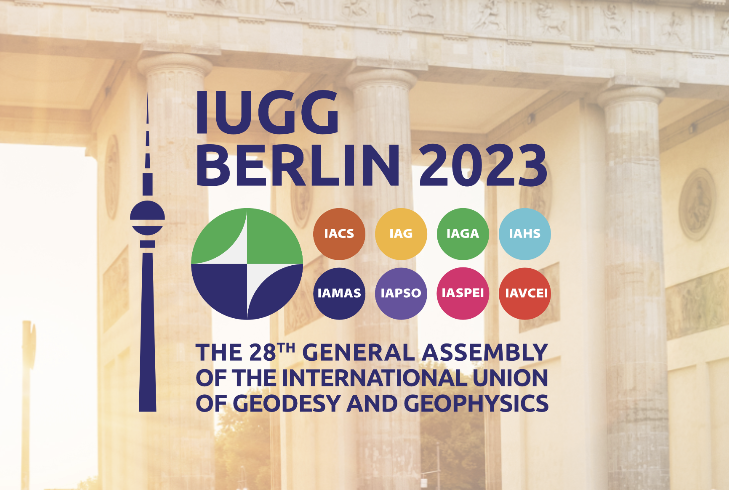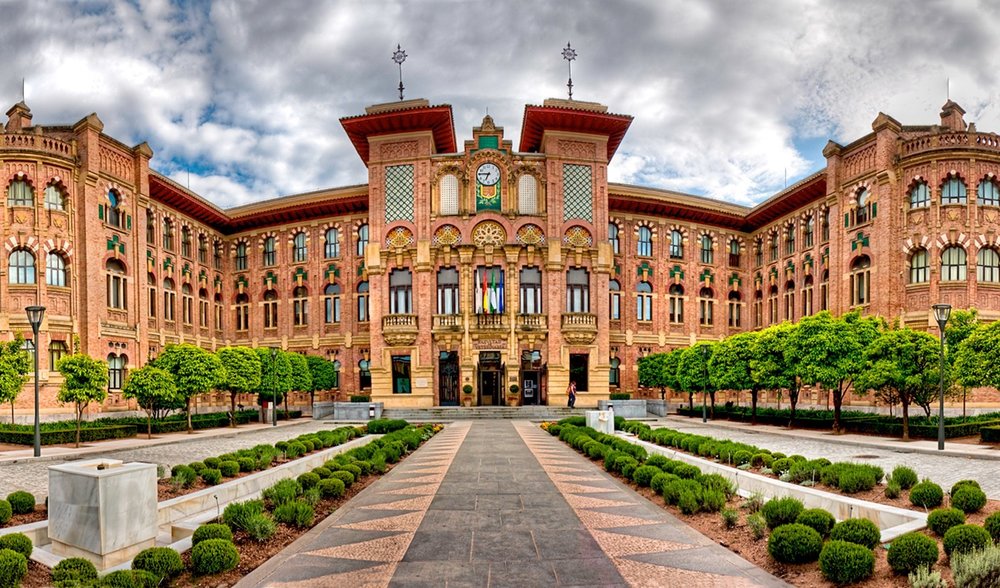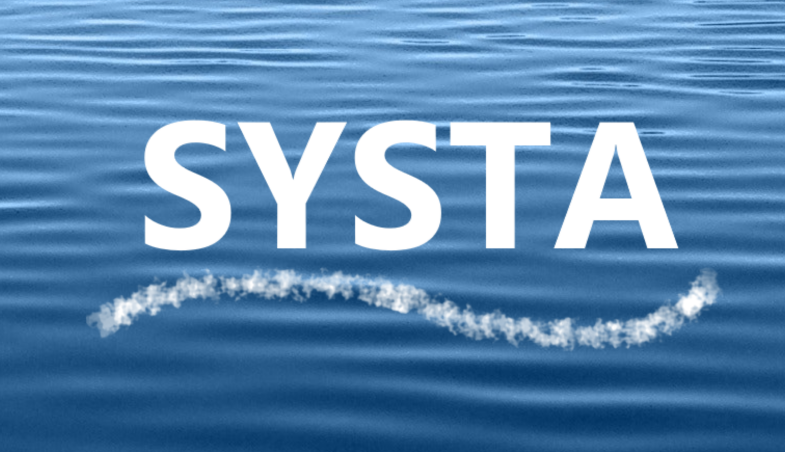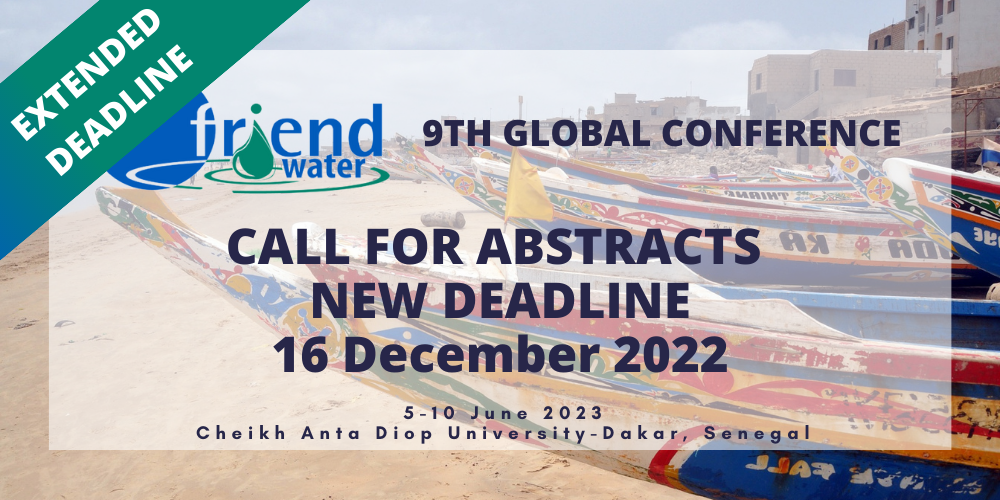Reminder: Abstract submission and SYSTA travel support to attend IUGG2023

The 28th IUGG General Assembly will be held July 11-20, 2023 at the CityCube in Berlin, Germany. This is a special opportunity for participants from around the world to come together and share their science and culture.
Abstract submission and online registration are open on the IUGG2023 website:
Registration: https://www.iugg2023berlin.org/registration-guidelines/#
Abstract submission: https://www.iugg2023berlin.org/abstract-submission/
Submission of a travel grant application: https://www.iugg2023berlin.org/travel-grant/
IAHS Sivapalan Young Scientists Travel Awards:
The closing date for applications for IAHS SYSTA travel support has been extended to 12 noon (GMT) on 5 January 2023. The award is to be used towards the costs of participating in the IAHS programme at the IUGG 2023 General Assembly during 12-16th July 2023.
Full details of the IAHS SYSTA eligibility criteria and application procedure can be found at: https://iahs.info/About-IAHS/SYSTA.do
Applications will be considered from hydrologists that meet ALL of the following criteria:
They grew up and now reside in a financially disadvantaged country.
They are registered for a PhD, or completed their PhD less than 5 years ago (an extra year per child is allowed for parents if they took parental leave).
There is evidence of their high quality/high potential as a scientist in the form of a paper of which they are first author in Hydrological Sciences Journal (HSJ) or Proceedings of the International Association of Hydrological Sciences (PIAHS) (or in another listed hydrological journal).
They have not previously received a SYSTA award for intercontinental travel.
They will be giving a presentation at the meeting.
Applicants must have submitted an abstract for the IUGG 2023 General Assembly. The maximum award value is 2500 euros.
New IAHS Working Group on the History Of Hydrology
At the IAHS Bureau meeting on 12th December 2022 Keith Beven presented a proposal to create a new IAHS Working Group on the History Of Hydrology and this was approved by the officers.
In this the Centenary year of IAHS it seems appropriate to consider a new international initiative on the History of Hydrology. Through the enthusiasm of some individuals, there have been past efforts to record some of the history of the science and its institutions (including the IAHS itself in Dan Rosbjerg and John Rodda’s 2019 paper in Hist. Geo Space Sci., 10, 109–118), but these have been somewhat fragmented and often limited in scope. The Working Group will, of course, be dependent on the enthusiasm and time of already busy individuals. However, we feel that there a number of areas where it will be possible to make valuable contributions.
The new Working Group will aim to make contributions in the following areas:
1. To provide a central repository for information on the History of Hydrology with liaison, links and metadata on the existing initiatives and copies or links to important historical papers from multiple countries.
2. To encourage more international contributions from countries that are not currently well represented in the existing resources, including the identification of important historical papers from those countries.
3. To encourage the recording of the contributions of female hydrologists (including interviews with late career female hydrologists).
4. To encourage the recording of the histories of experimental catchments where important advances in understanding of hydrological processes have been made.
5. To encourage the recording of the histories of hydrological models and the people who worked with them.
6. To provide a mechanism for the recording of the history of projects representing good practice in sustainable hydrology for societies under change, building on the Case Studies in Panta Rhei.
How to get involved.
The initial development of the Working Group has been by means of personal contacts but if you would like to be involved in contributing to the Working Group then please send an email to [email protected] A special session on the History of Hydrology will also be held at the IUGG/IAHS meeting in Berlin in 2023.
IAHS Awards – call for nominations
Nominations are currently being accepted for the three main awards as follows:
IHP
The International Hydrology Prize is awarded annually by IAHS, with UNESCO and WMO, to two people who have made an outstanding contribution to hydrological science. More information on how to nominate including the list of previous awards is available here.
Two medals are awarded under the International Hydrology Prize: the Dooge medal and the Volker medal. Both medals are intended to distinguish outstanding achievements by hydrological scientists but with a different focus. The Dooge medal is aimed at fundamental contributions to the science of hydrology, whereas the Volker medal is aimed at outstanding applications of hydrological science for the benefit of society at large.
Tison Award
The IAHS Tison Award, established in 1982, aims to promote excellence in research by young hydrologists. The Award will be granted for an outstanding paper published by IAHS in a period of two years previous to the deadline for nominations. More information of how to nominate and the list of previous awards is available here.
Falkenmark Award
This new award, the Falkenmark Award, will be awarded for the first time in 2023 for the best PhD thesis recognising outstanding contributions to hydrological understanding of water scarcity and water supply. Full details of how to nominate can be found here.
Nominations for all awards should be received by the Secretary General, Christophe Cudennec at [email protected], no later than 31 December 2022.
Cordoba Workshop to identify the next IAHS Scientific Decade

IAHS has initiated two scientific decades, which set the research agenda worldwide through collaborative forces.
2003-2012: Predictions in Ungauged Basins (PUB)
2013–2022: Panta Rhei — Everything Flows: Change in hydrology and society
The overall aim with a Scientific Decade is to accumulate knowledge and streamline research efforts worldwide. Previous experience show that such initiatives foster engagement, sharing and collective focus to better understand specific hydrological problems or phenomena - and thereby accelerate scientific achievements.
After two successful decades, IAHS want to once more boost the community through launching a third topic for collaborative efforts in hydrological sciences.
An online discussion will be opened soon, open to any hydrologist. An in-person event with limited number of participants will be held 1-3rd February 2023 in Córdoba, Spain, to capitalise on the online discussion and decide on the topic. This will not be a hybrid meeting but with frequent online forum iterations every day.
Full details of the agenda and how to register can be found on the Córdoba workshop page.
To encourage wider diversity and attendance by early career scientists we have a few grants of up to €2500 each to cover travel and accommodation for scientists from financially disadvantaged countries and/or early career scientists (registered for a PhD, or within 5 years of PhD completion), which should be applied for by 15th December 2022.
2023 Election of Officers of IAHS - Reminder
We would like to remind you that applications are now sought for the roles of IAHS Bureau and Commission Officers. For full information, and how to apply for a position, see the Election of Officers page on the IAHS website. Application Deadline 11 Jan 2023.
The officers of the IAHS Bureau and Commissions are elected every 4 years at the General Assembly of the International Union of Geodesy and Geophysics (IUGG). Next elections will be held in IUGG2023 in Berlin, 11-20 July during the IAHS Plenary Administrative Session (exact date to be decided, between 12 and 16). Countries, which are IUGG members at the time, have one vote each. IAHS would like to draw attention to the following roles which are available for election (application by 11 Jan 2023):
-
- For the Association: President Elect (to become President after two years), 3 Vice Presidents, Secretary General
- For each of the ten International Commissions: President Elect (to become President after two years), 3 Vice Presidents, Secretary.
IAHS is an inclusive association and all hydrologists of the world participating in the work of the Association are entitled to stand as candidates for these positions, with the exception of the candidate for the President-Elect of the Association who shall be a citizen or resident of a country adhering to the IUGG.
For full information, and detail of how to apply for a position, see our Election of Officers webpage.
Application deadline extended for SYSTA awards to attend IUGG2023

The closing date for applications for IAHS SYSTA (SIVAPALAN YOUNG SCIENTISTS TRAVEL AWARDS) has been extended to 12 noon (GMT) on 5 January 2023 for the upcoming IUGG 2023 General Assembly. The award is to be used towards the costs of participating in the IAHS programme in Berlin, Germany during 12-16th July 2023.
Full details of the SYSTA eligibility criteria and application procedure can be found here
Applications will be considered from hydrologists that meet ALL of the following criteria:
-
- They grew up and now reside in a financially disadvantaged country
- They are registered for a PhD, or completed their PhD less than 5 years ago (an extra year per child is allowed for parents if they took parental leave)
- There is evidence of their high quality/high potential as a scientist in the form of a paper of which they are first author in Hydrological Sciences Journal (HSJ) or Proceedings of the International Association of Hydrological Sciences (PIAHS) (or in another listed hydrological journal)
- They have not previously received a SYSTA award for intercontinental travel
- They will be giving a presentation at the meeting.
Applicants must have submitted an abstract for the IUGG 2023 General Assembly. The maximum award value is 2500 euros.
Applicants should simultaneously apply for an IUGG 2023 travel grant
Call for Abstracts FRIEND-Water Global Conference deadline extended

The 9th FRIEND-Water Global Conference will be held in Dakar, Senegal from 5 to 10 June 2023.
As a flagship initiative of IHP IX (2022-2029), FRIEND-Water aims to put science into action to secure water resources.
This year's meeting will be dedicated to the theme "Addressing unsolved problems in hydrology for a water secure world in a changing environment".
FRIEND-Water contributes to international research by studying long-term variations and changes in hydrological regimes. The programme aims to better understand climate and watershed controls, as well as human influence on the spatial and temporal distribution of water. This initiative brings together more than 160 countries who are looking forward to seeing you in Dakar in 2023.
The call for abstracts is now open until the 16 December 2022.
Register now for the IUGG 2023 General Assembly in Berlin

The 28th IUGG General Assembly will be held July 11-20, 2023 at the CityCube in Berlin, Germany. This is a special opportunity for participants from around the world to come together and share their science and culture. Join us for a host of scientific activities, including special public lectures, keynote Union lectures and a wide variety of themed sessions.
Abstract submission, online registration and submission of travel grant applications are now open on the website.
The IAHS-led programme will be over the first half of the Assembly ie 12-16 July 2023. Details of the IAHS symposia can be found here:
IAHS standalone symposia
Inter-Association symposia led by IAHS.
This event is eligible for IAHS SYSTA travel award support. The closing date for SYSTA applications for upcoming IUGG 2023 General Assembly is 12 noon (GMT) on 6 December 2022.
International Hydrology Prize – Call for nominations
The International Hydrology Prize is awarded annually by IAHS, with UNESCO and WMO, to two people who have made an outstanding contribution to hydrological science. Nominations for the Prize are made by National Committees to IAHS, National Committees to the UNESCO-IHP or National Hydrological Advisors to the WMO, and forwarded to the Secretary General of IAHS for consideration by the Nomination Committee. The Committee consists of the President and a Vice-President of IAHS, as well as representatives from UNESCO and WMO.
Two medals are awarded under the International Hydrology Prize: the Dooge medal and the Volker medal. Both medals are intended to distinguish outstanding achievements by hydrological scientists but with a different focus. The Dooge medal is aimed at fundamental contributions to the science of hydrology, whereas the Volker medal is aimed at outstanding applications of hydrological science for the benefit of society at large.
The following applies to both the Dooge and Volker medals
The International Hydrology Prize shall be awarded to persons who have made outstanding contributions to hydrology such as confers on the candidate universal recognition of his or her international stature.
The contribution should have an identifiable international dimension extending beyond both the country of normal work and the specific field of interest of the candidate.
The medals may be awarded to hydrologists of long international standing or to younger but active hydrologists who exhibit qualities of international leadership in the science or practice of hydrology.
An active involvement in the work of IAHS and other international organisations in the field of hydrology should be counted as an advantage.
Specific considerations for the Dooge medal:
The Dooge medal is particularly intended for hydrologists who have demonstrated scientific excellence, and have made fundamental contributions to the science of hydrology as evidenced by publications in the international scientific literature and other evidence of high standard.
Preference should be given to candidates who have recently exhibited outstanding international leadership in the science of hydrology.
Specific considerations for the Volker medal
The Volker medal is dedicated for hydrologists who have applied their research and hydrological expertise to the benefit of society, addressing issues of public interest and development.
Applications of hydrology to the benefit of developing countries would count as an advantage.
Preference should be given to candidates who have contributed through both scientific and practical work, and who have made outstanding contributions to the Hydrology community as demonstrated by active involvement in the work of IAHS or other international hydrological associations.
Nomination format and procedure
Nominations should be received by the Secretary General of IAHS no later than 31 December 2022 – Christophe Cudennec at [email protected] – and consist of:
-
- a (max. 2, pages A4 format) nomination letter signed by a National Representative to IAHS, the President of a national committee of UNESCO-IHP, or a National Hydrological Advisor to the WMO, with one sentence citation (max. 200 characters), and stating why the nominee is the most qualified person to receive the Volker or Dooge medal, paying attention to the medal's dedication specified above
- the nominee’s CV (max. 3 pages, A4 format) with an emphasis on the contribution to hydrological science and international scientific cooperation, providing clear information on the main criteria used for the evaluation and the specific considerations mentioned above
- a list of the major scientific publications (max. 2 pages, A4 format).
Nominations are expected from the world diversity, and equally for female and male candidates.
Evaluation criteria
a) Outstanding contributions to hydrology evidenced by universal recognition of his or her international stature.
b) Identifiable contributions with international dimensions extending beyond both the country of normal work and the specific field of interest of the candidate.
c) For senior candidates proof of Hydrologists activities of long international standing, or for younger candidates, proof of being active hydrologists with qualities of international leadership in the science or practice of hydrology.
d) Active involvement in the work of IAHS and other international organizations in the field of hydrology is counted as an advantage.
e) Application of the hydrological research performed and the use of his/her expertise to the benefit of society and addressing issues of public interest and development.
f) Applications of hydrology to the benefit of developing countries counts as an advantage.
Tison Award - Call for Nominations
Nominations are now being accepted for the IAHS Tison award.
The IAHS Tison Award, established in 1982, aims to promote excellence in research by young hydrologists. The Award will be granted for an outstanding paper published by IAHS in a period of two years previous to the deadline for nominations. More information, including the list of previous awards, is available here.
The following criteria are valid:
Candidates for the Award must be under 41 years of age at the time their paper was accepted for publication.
The Award will consist of a citation in the name of L.J. Tison, an amount of US $1,000 and a free subscription to HSJ for one year. If the successful paper is jointly authored by eligible (age) authors, the monetary award will be divided equally between authors.
The Award will be announced annually and will be presented in a public ceremony, normally during either an IUGG/IAHS General Assembly or an IAHS Scientific Assembly.
Nominations for the Tison Award may be submitted by the National Committees of IAHS, officers of the IAHS Bureau, officers of the Commissions, HSJ editorial board members, convenors of IAHS symposia or editors of proceedings. Nominations may not be submitted directly by an author or co-author, but may be submitted through one of the aforementioned individuals. The nominations should be sent directly to the Secretary General of IAHS and should contain a reasoned argumentation and noted validation of the candidate’s age.
The Award Committee may not recommend an Award in any one year if none of the papers submitted is of sufficiently high standard.
Nominations for the Award should be received by the Secretary General, Christophe Cudennec at [email protected], no later than 31 December 2022.
